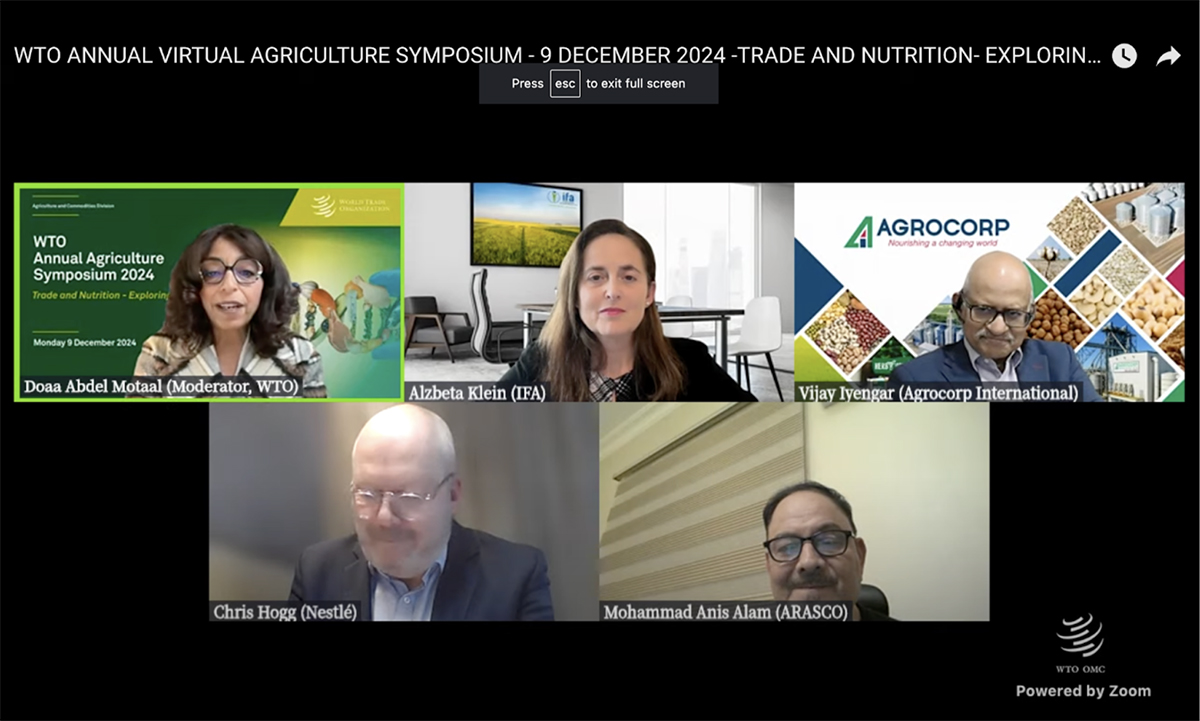December 9, 2024
Along with other figures from agrifood, GPC President Vijay Iyengar participated in a World Trade Organization panel exploring the intersection between trade and nutrition, highlighting the importances of pulses in the nutrition transition.


The December 9 WTO Annual Agriculture Symposium panel on "Trade and Nutrition: Exploring the Nexus" brought together experts from various sectors to discuss the intricate relationship between global trade, agriculture, and nutrition. Key speakers included representatives from the International Fertilizer Association (IFA), Nestlé, ARASCO, and Global Pulse Confederation (GPC) President Vijay Iyengar.
Alzbeta Klein of IFA emphasized the critical importance of soil health, noting that 33% of world soils are moderately to highly degraded, according to the UN. She warned that damaged soils lead to reduced crop yields and highlighted the need for precision in plant nutrition to ensure a balanced food supply and high nutritional value for all crops. Klein also discussed the role of governments in introducing vital elements, like zinc, into soils to help combat nutrient deficiencies.
Chris Hogg from Nestlé highlighted the company's pioneering role in publishing nutritional values on products. He pointed out that Nestlé is also focusing on regenerative agriculture and working towards enhancing comparability between food companies to address public health challenges.
Representing both GPC and Agrocorp, Vijay Iyengar emphasized the potential of pulses as a sustainable and nutritious food source that is a vital component in the nutrition transition. Pulses are particularly valuable as they can grow in arid conditions, are often cultivated by smallholder farms, and are high in protein.
Following Vijay’s comments, the moderator took a moment to praise pulses for their excellent qualities, adding that many viewers may be inspired to learn more about them after hearing of their benefits.
Vijay Iyengar suggested various policy approaches to address food insecurity, including:
- Improving access to healthy food options
- Targeted subsidies to increase the production and consumption of nutritious foods, such as pulses
- Reformulating food offerings to meet changing nutritional requirements and climate change concerns
- Keeping supply chains open and eliminating trade barriers
- Implementing blended finance for sector investment
The panel highlighted the need for evidence-based regulation, coherence between WHO, WTO, and FAO agendas, and the importance of dietary changes. A key goal mentioned by Vijay Iyengar was achieving a 30% share of plant protein consumption by 2050, particularly in higher-income countries. He stressed that we can and should all aspire to this and highlighted progress in Denmark, which recently moved to impose a carbon tax for livestock emissions.

WTO / Agrocorp / Vijay Iyengar / Nestle / nutrition transition / trade policy / IFA / fertilizer
Disclaimer: The opinions or views expressed in this publication are those of the authors or quoted persons. They do not purport to reflect the opinions or views of the Global Pulse Confederation or its members.